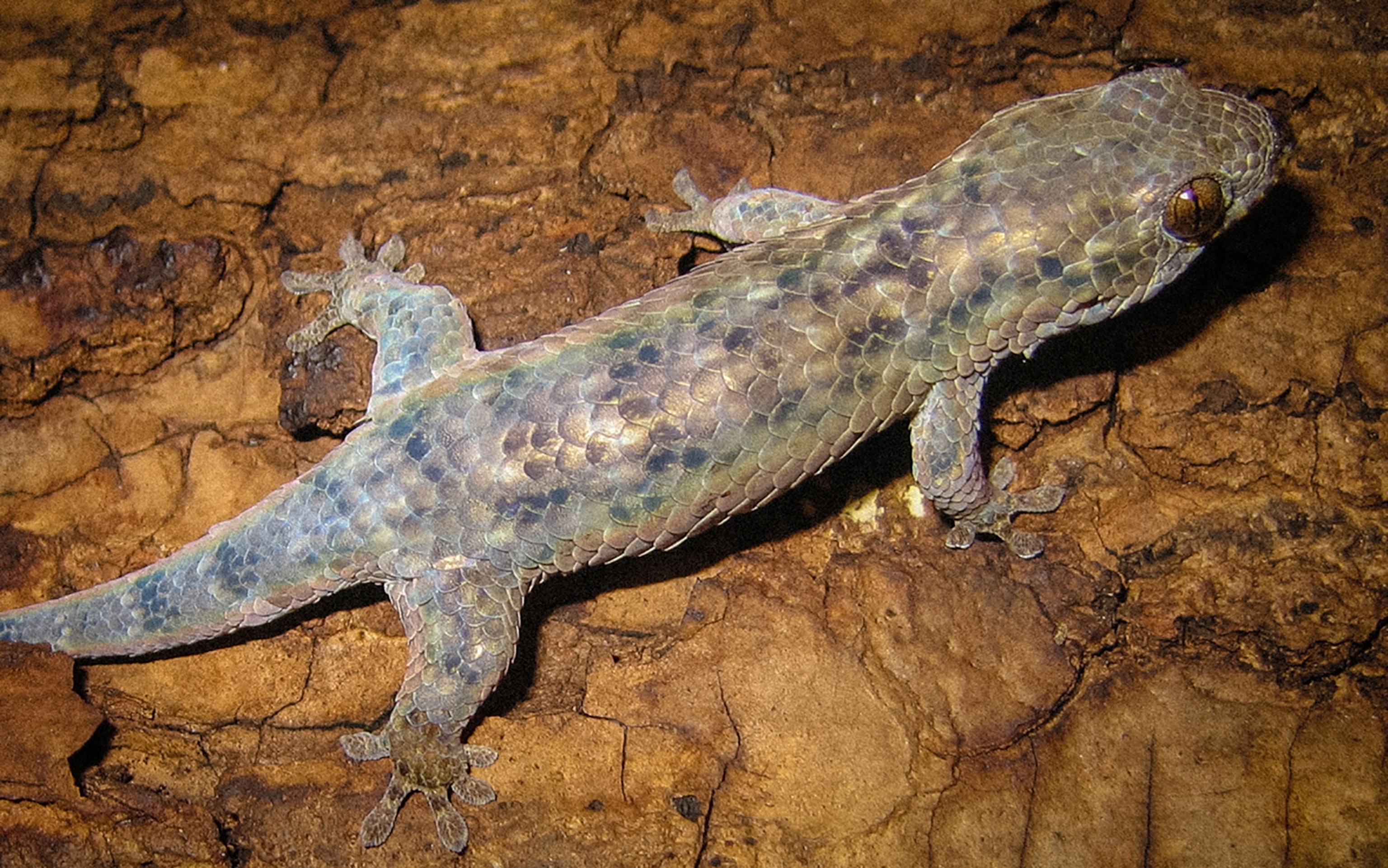
New Gecko Sheds Skin on Demand, Looks Like Raw Chicken
The Madagascar native has unusually large scales that it can drop with extraordinary ease, a new study says.
Tear-away pants may provide comic relief on the big screen, but for some geckos, shedding skin fast can mean life or death.
Meet Geckolepis megalepis, a new species of fish-scaled gecko from Madagascar that can drop its scales on demand—all the way down to the muscle. The tropical creature joins four other lizard species that lose their skin when threatened, similar to the well-known reptilian strategy of shedding tails to escape predators. (Read about an overachieving lizard that grew three tails.)
The newfound reptile is notable for the extraordinary size and thickness of its scales—its Latin name means "very large scales." Almost like bony plates, the scales shear bloodlessly off G. megalepis along a special layer of cells at the base oft the skin called the "tear zone." The scales regenerate quickly, in mere weeks.
It's also unusual among its relatives in that it seems to shed skin with extraordinary ease.
“I personally have only ever once managed to catch one of these geckos without losing more than a few scales,” says study author Mark Scherz, a Ph.D. student at the Ludwig Maximilian University of Munich.

“I was elated! You can look at any museum with these geckos and you see how seldom the [skin] stays intact. It’s almost ridiculous.”
Mistaken Identity
Indeed, in the late 19th century, scientists who first discovered this group of odd geckos in Madagascar had the same problem, describing how hard it was to catch tear-away geckos without losing a lot of scales. (In more recent times, researchers try to avoid direct contact altogether by luring them into bags.)
When the gecko loses its skin, it probably sees a humid shelter, Scherz adds. "I would imagine the geckos stay in such a shelter until the regeneration process is at least started, but I've never come across a gecko in the wild that still had exposed flesh from a previous encounter."
The numbers and patterns of scales are a central feature herpetologists use to identify and distinguish species from one another—part of the reason why it took so long to identify G. megalepis as a new species. Not only does the gecko look a lot like its relatives, it's also secretive and well camouflaged.
For instance, researchers collected the first specimens of G. megalepis in 2004 in the craggy karst limestone terrain of Ankarana National Park, but the individuals were mistakenly lumped together with a similar looking species, G. maculata.
When genetic work in 2013 suggested as many as 12 distinct species of Geckolepis exist or once existed, Scherz decided to take a new approach to analyzing the geckos that didn't rely on outward appearance—observing their skeletal structures in sharp detail. (See "Spider-Man Ready: 5 Animals That Regrow Parts.")

Scherz worked with one of his doctoral advisors, Frank Glaw, to take micro-computed tomography scans of G. megalepis skeletons.
Notating minute differences in skeletal anatomy, including differences in the shape of some vertebrae and nasal bones, Scherz and colleagues identified G. megalepis as a distinct species, according to the study, published February 7 in the journal PeerJ.
Reptile Richness
And though Scherz and colleagues have placed the species on the gecko family tree, he has no clue how the geckos recognize each other.
“We frequently see two different genetic lineages sitting side by side in an area, and we have no idea how they tell each other apart. Maybe it’s behavioral, maybe it’s pheromones, or the shape of the scales. We just don’t know.”

Though the geckos' karst habitat is protected, they're under threat from nearby sapphire mining operations, human-caused fires, and free-ranging livestock—as well as their small home ranges. (Also see "Geckos May Be Famously Sticky, but Here's What Stumps Them.")
For these reasons, Scherz recommends that the International Union for Conservation of Nature list the species as near threatened.
Madagascar is home to 350 species of terrestrial reptiles, 90 percent of which are found nowhere else in the world, notes Neil D’Cruze, who leads wildlife research and policy at the World Society for the Protection of Animals in London.
"More baseline survey work is sorely needed to understand and subsequently protect the true reptile richness of this biodiversity hot spot.”
Follow Michelle Z. Donahue on Twitter.